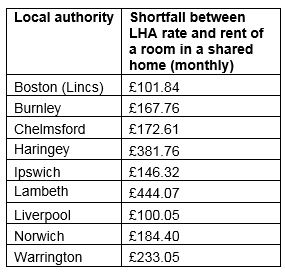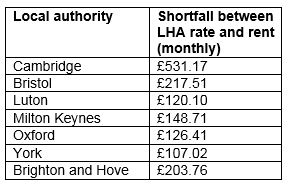Renters on a low income breathed a sigh of relief last year when the government said it would not make any additional benefit cuts. But last week’s confirmation of the removal of housing benefit for 18-21-year-olds come April and the rollout of the reduced benefit cap earlier this year, show that there are still many reasons to be worried.
Often overlooked is the fact that all private renters in need of housing benefit (more than 1.2 million households) are also still in line for further cuts – cuts this year, next year and the year after. This is because of the freeze to something called Local Housing Allowance (LHA).
New Shelter analysis published this week shows that the majority of these households are already pushed into an unworkable situation – and any further cuts would be incredibly difficult to bear. People claiming housing benefit are expected to find a home to rent which is towards the cheaper end of the market. But a succession of government cuts since 2010 means there are now wide gaps between the amount of housing benefit available and the cost of renting one of the cheapest homes in an area. And this is before future cuts are made.
How large is the gap between what people need and what they can claim?
Young people
The rules assume that younger renters will rent a room in a shared house. The analysis shows that they may struggle to afford even this.
Data isn’t available for every area. But where it is, we can see that across the country young people face large shortfalls between the rent of a room in a shared house and the support they can receive. These places are not just exclusive postcodes. In Burnley, young people face a shortfall of £167.76 a month between support and the cost of renting a room.

Families
Families will struggle too. In four out of five areas, housing benefit no longer covers the costs of renting a two bed home at the cheapest part of the market. In one in four areas, the shortfall between rent and support is over £100 a month.
Families living in London face the greatest shortfalls, but those outside of the capital will also be badly hit. In Cambridge, for example, a family will be expected to find £531 a month to top up their housing benefit in order to pay the rent for one of the cheapest homes in the area. In Bristol, a family would face a shortfall of nearly £217 a month.

What impact could this have?
It is hard to see a situation where continuing this freeze does not lead to further homelessness. As the shortfall grows, it becomes harder for households to meet rent payments or to find somewhere else to live if they have to move. Regular moves are a reality for private renters – last year over a million renting households had to find a new tenancy. For households in need of housing benefits, this means finding one of the dwindling number of homes they can afford, hoping it is offered by one of the minority of landlords who let to people on housing benefit and persuading them that they can and will cover the rent. Looking at the shortfall between rent and support, it is no wonder that so many households struggle to meet these three tests that the loss of a private tenancy is now the leading cause of homelessness in England.
Worryingly the freeze is also undermining vital government efforts to reduce homelessness. The government is supporting new legislation that places duties on councils to prevent and relieve homelessness. But because of a dwindling amount of social housing, one of the main ways that councils can do this is to find people a new privately rented home. The LHA freeze means that councils also face the same struggle to find landlords willing to take families. Just yesterday the local government association revealed that councils are spending two million pounds a day supporting families with temporary accommodation. They cite the LHA freeze as one the main drivers of this.
What is a way forward?
Despite noises to the contrary, cuts to housing benefit have only just begun. The government must lift the freeze on LHA to ensure that their efforts to reduce homelessness do not fail. Millions of people are in line to bear the cost of inaction.
